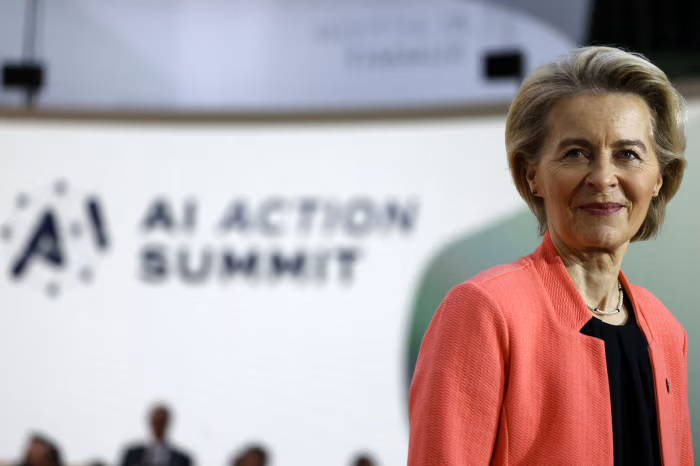EU Invests €200 Billion in AI to Compete with US and China
The global race for artificial intelligence dominance is accelerating, and the European Union is making a bold move to strengthen its position. At the AI Action Summit in Paris, European Commission President Ursula von der Leyen announced “InvestAI,” a groundbreaking €200 billion initiative aimed at boosting AI research, infrastructure, and innovation across the EU. This initiative is designed to help Europe compete with technological giants like the United States and China and establish itself as a leader in the AI revolution.
A Landmark Investment in AI
The EU’s investment strategy consists of €50 billion in public funding, supplemented by €150 billion from the European AI Champions Initiative, a coalition of private investors. One of the primary focuses of this initiative is the development of AI gigafactories, which will serve as key hubs for training and deploying advanced machine-learning models.
During her speech, von der Leyen emphasized the importance of AI in shaping Europe’s future. “We want Europe to be one of the leading AI continents, and this means embracing a way of life where AI is everywhere,” she stated. She underscored that while AI must be powerful and innovative, it should also adhere to ethical guidelines that ensure safety, fairness, and transparency.
France has also taken an independent but complementary step in AI investment. President Emmanuel Macron announced a €109 billion national AI initiative, mirroring large-scale efforts in the United States, such as the $500 billion “Stargate” AI project launched under former President Donald Trump.
Balancing AI Innovation and Regulation
Despite the EU’s ambitious investment, its AI regulatory framework has drawn mixed reactions. The AI Act, which came into force in July 2024, establishes Europe’s commitment to ethical AI development by enforcing transparency, safety, and accountability standards. This regulatory approach aims to prevent risks such as AI bias, misinformation, and unchecked surveillance.
However, the EU’s strict regulations have not been universally welcomed. US Vice President JD Vance criticized the framework, calling it “authoritarian censorship” and warning that such measures could stifle innovation. This growing divide became more apparent when both the US and the UK declined to sign the Paris AI Summit Declaration, a global agreement promoting ethical AI cooperation.
AI as a Geopolitical Battleground
The European Union’s €200 billion investment is part of a broader global trend where nations are intensifying efforts to secure AI leadership. The US and China, long-standing AI powerhouses, continue to dominate AI research and commercialization. Companies like OpenAI in the US are developing state-of-the-art models such as ChatGPT, while Chinese firms like DeepSeek are rapidly advancing AI capabilities.
Recognizing this competitive gap, the EU seeks to establish itself as a pivotal force in AI, ensuring European talent and enterprises remain at the forefront of technological advancement. This initiative is not just about driving economic growth but also about securing Europe’s technological sovereignty and shaping AI in a way that aligns with European values.
A Defining Moment for Europe’s Technology Strategy
The EU’s historic investment underscores its determination to be a key player in AI rather than a passive participant. The competition among the EU, the US, and China is no longer just about technological breakthroughs—it is also about defining the ethical and regulatory frameworks that will shape the future of AI.
While critics argue that strict regulations could hinder rapid AI development, others believe that prioritizing ethical oversight will create a safer and more accountable technological ecosystem. Regardless of these debates, one thing is clear: AI is not just a technological challenge; it is also a geopolitical one. The coming years will determine whether Europe can carve out a leadership role in AI alongside Silicon Valley and Beijing.




















































